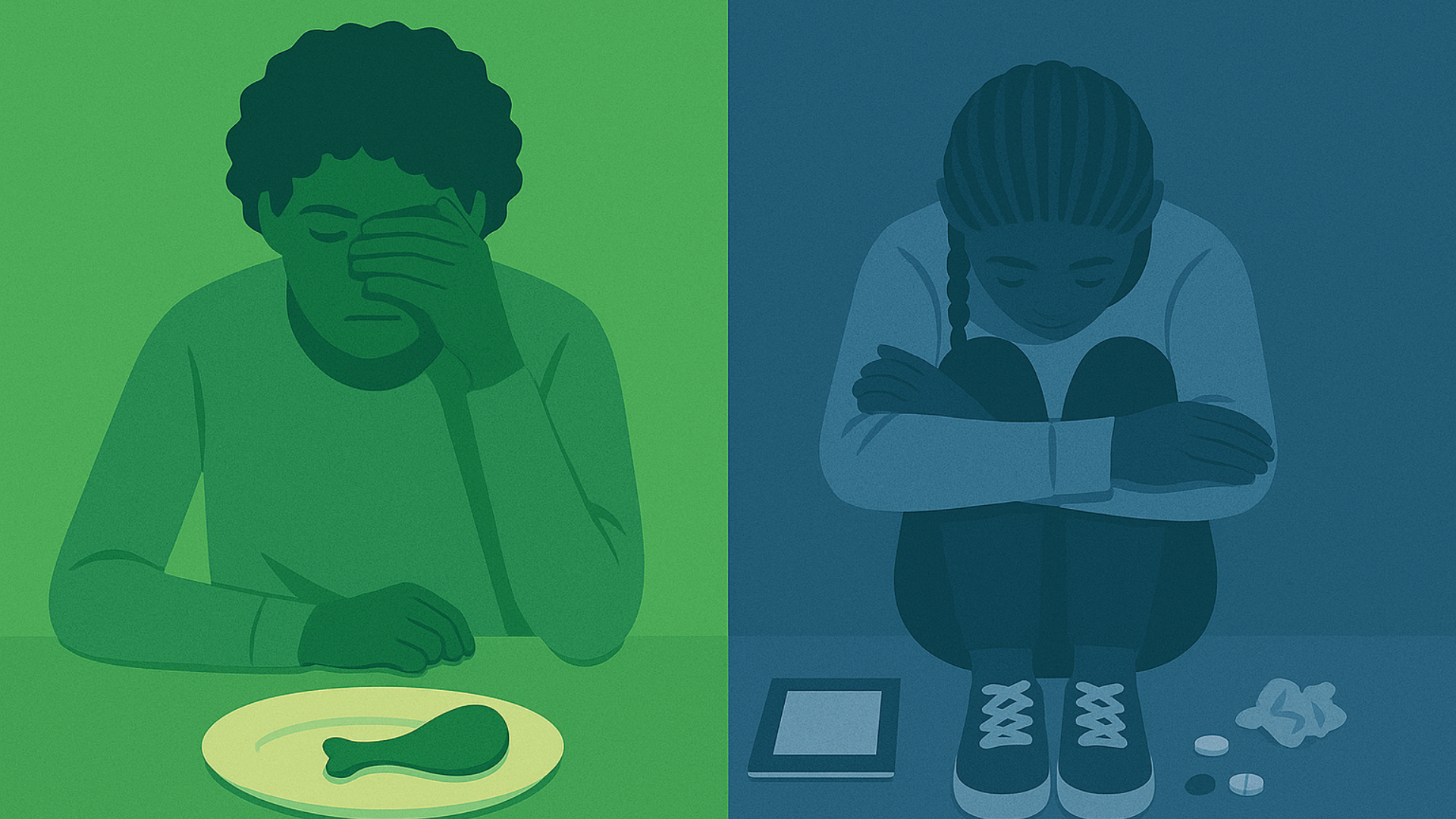Breaking Down the Stigma Surrounding Eating Disorders: Anorexia and Bulimia

The end of February marks National Eating Disorder Awareness (NEDA) Week ! During the entire month of February, Thrive is focusing on raising awareness and breaking down the stigma surrounding eating disorders. This week, we are highlighting anorexia and bulimia, some of the most common types of eating disorders. Most people assume that individuals choose to have an eating disorder, which contributes to the social stigma — but really eating disorders are serious mental and physical illnesses. In fact, 50 to 80 percent of the risk factors for anorexia are genetic. Paired with genetics and societal pressures, anyone can suffer from an eating disorder.
Anorexia nervosa, the number one killer among any mental health diagnosis
Anorexia nervosa is typically characterized by weight loss, difficulties maintaining an appropriate body weight for height and age, and in many cases, distorted body image. Usually, an individual struggling with anorexia restricts the number of calories and types of food they consume, in fear of gaining weight. Oftentimes, anorexia is accompanied by excessive exercising, purging via vomiting and laxatives, or binge eating.
Anorexia is the number one killer among all mental health disorders. The cycle of self-starvation found in anorexia denies the body of the vital nutrients it needs to function normally. This causes the body to slow down all of its processes to conserve energy and can result in serious medical consequences. Sometimes medical testing doesn’t reflect how medically compromised these individuals are. This is because electrolyte imbalances and cardiac arrest (two common medical complications that can be of serious concern) can be fatal and come on without warning.
Bulimia nervosa, the sneaky eating disorder
Bulimia nervosa is another common eating disorder that is also life-threatening. Bulimia is characterized by a cycle of binge eating and compensatory behaviors. For example, individuals suffering from bulimia induce vomiting to undo or compensate for the effects of binge eating. Usually, those struggling with bulimia are concerned with weight loss, dieting, and control of food.
If you notice an individual taking frequent trips to the bathroom during or after a meal this can be a sign that they may be struggling with bulimia. It can be difficult to identify someone suffering from bulimia because of the extreme lengths they go to in order to keep their “secret.” Because of the recurring binge-and-purge cycles that come with bulimia, the individual’s entire digestive system is affected. Binging and purging can lead to electrolyte and chemical imbalances in the body that affect the heart and other major organs.
The psychological effects of anorexia and bulimia
People struggling with anorexia and bulimia tend to be perfectionists and sometimes struggle with low self-esteem, causing them to be critical of themselves and their bodies. There is an intense fear of gaining weight. They often use their eating disorder as a way to feel in control. In most cases, eating disorders are accompanied by other mental health disorders like anxiety, obsessive-compulsive disorder, and substance abuse.
Let’s play MythBusters!
“People with anorexia are always extremely underweight. You can tell they have it just by looking at them.” FALSE! People with anorexia do not have to be underweight to be struggling. Anorexia can affect any body type and size.
“They always cook dinner and are talking about food. There’s no way they have anorexia.” FALSE! People struggling with anorexia often obsess over food and always talk about food. If you notice they are talking about food more often than not without actually eating in front of anyone, this could be a sign they are struggling!
“Fitness is just a major hobby of theirs. It is normal for them to be at the gym all the time and exercise multiple times a day.” FALSE! Excessive exercising can be a sign of an eating disorder. Usually, those struggling with an eating disorder feel they need to burn all the calories they consume so they do not gain weight.
“Dieting is a healthy lifestyle, it is okay to cut out certain foods because they are bad for you.” FALSE! Dieting is a potential gateway to most eating disorders and food issues. When you limit what you eat, you are ignoring your body’s cues. Labeling food as good or bad is extremely damaging to your relationship with food. Think of your body as your friend. It is telling you what it needs.
“They must have a small bladder. They are going to the bathroom a lot during dinner.” FALSE! Well maybe they do have a small bladder, or maybe they are struggling with an eating disorder. As friends and family we are here to support and help, not judge.
“They are an athlete. Of course, they have to eat a certain way.” FALSE! A study found that 35 percent of female and 10 percent of male college athletes were at risk for anorexia nervosa and 58 percent of female and 38 percent of male college athletes were at risk for bulimia nervosa.
Thrive, don’t just survive!
Thrive understands the complex psychological and physical effects that come with an eating disorder. That is why we use a multidisciplinary approach that addresses every part of the client — mind, body, and soul. Let us help you on your path to recovery by healing your relationship with yourself, your body, and food. We offer various levels of care for eating disorders, including an intensive outpatient program, partial hospitalization program and outpatient therapy. Start thriving!
The post Breaking Down the Stigma Surrounding Eating Disorders: Anorexia and Bulimia first appeared on Thrive Wellness.








